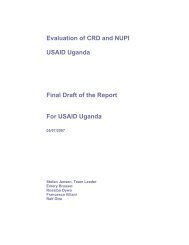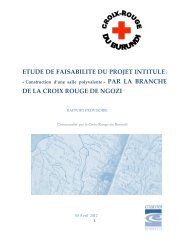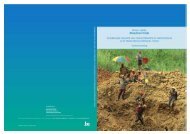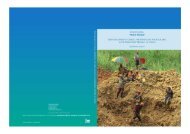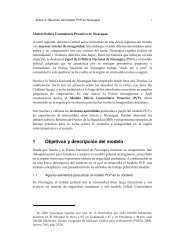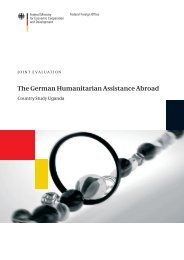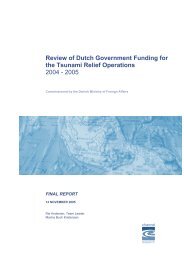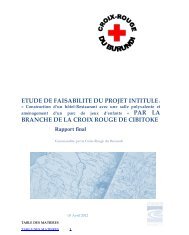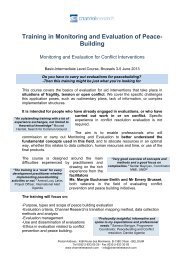A ripple in development? - Channel Research
A ripple in development? - Channel Research
A ripple in development? - Channel Research
Create successful ePaper yourself
Turn your PDF publications into a flip-book with our unique Google optimized e-Paper software.
and Italy. The Programme’s objective was “to develop the capacity of<br />
government and civil society <strong>in</strong> the plann<strong>in</strong>g, disaster and <strong>in</strong>formation<br />
coord<strong>in</strong>ation, management and delivery of recovery and reconstruction<br />
services on a susta<strong>in</strong>able basis.” 86 This was to be undertaken through<br />
capacity <strong>development</strong> of public adm<strong>in</strong>istration, local government, civil<br />
society, and the private sector for manag<strong>in</strong>g and deliver<strong>in</strong>g susta<strong>in</strong>able<br />
recovery services. This case provides <strong>in</strong>sight <strong>in</strong>to the design and implementation<br />
of a broad capacity <strong>development</strong> <strong>in</strong>itiative that worked<br />
toward DRM policy <strong>development</strong>, strengthen<strong>in</strong>g local adm<strong>in</strong>istrative<br />
capacity to prepare for disasters, and work with civil society <strong>in</strong> a more<br />
enabl<strong>in</strong>g manner 87 . CADREP ended with<strong>in</strong> three years but offers <strong>in</strong>sight<br />
<strong>in</strong>to how district and national governments can work with a multilateral<br />
agency to implement capacity <strong>development</strong>.<br />
Care Society <strong>in</strong> the Maldives is a rare example of a civil society<br />
organisation (CSO) that worked on local <strong>development</strong> issues before the<br />
tsunami. After the tsunami, Care Society reached out to the affected<br />
population directly and worked to <strong>in</strong>fluence public policy <strong>in</strong> favour of<br />
the victims.<br />
Care Society is an NGO registered with M<strong>in</strong>istry of Home Affairs<br />
s<strong>in</strong>ce 1998. Care Society aims at improv<strong>in</strong>g lives of local vulnerable people.<br />
Care Society is supported by around 300 resource members. Build<strong>in</strong>g<br />
capacity of NGOs and CBOs and respond<strong>in</strong>g <strong>in</strong> times of disasters<br />
are two of the Care Society’s four aims. Before the tsunami, Care Society’s<br />
ma<strong>in</strong> focus was on disability. After the tsunami, Care Society tra<strong>in</strong>ed<br />
up to 250 <strong>in</strong>dividuals <strong>in</strong> psycho social tra<strong>in</strong><strong>in</strong>g as well as <strong>in</strong> women’s rights,<br />
counsell<strong>in</strong>g, and conflict resolution with Action Aid and Oxfam support.<br />
In addition, <strong>in</strong> 14 islands, up to 700 <strong>in</strong>dividuals were provided support<br />
for livelihoods by Care Society. A total of 230 families were provided<br />
with agriculture support. Care Society also launched nation-wide<br />
wide network of Violence aga<strong>in</strong>st Women <strong>in</strong>clud<strong>in</strong>g with women<br />
affected by tsunami and built five pre-schools and safe play areas for<br />
children on various affected islands to promote risk reduction. The focus<br />
of DRM <strong>in</strong> Maldives, so far, has been on tsunami risk, storm surges, fire,<br />
and climate risk. Storm surges and cyclonic w<strong>in</strong>ds are the ma<strong>in</strong> rapid<br />
onset hazards fac<strong>in</strong>g Maldives, particularly along atolls <strong>in</strong> the north<br />
between May and July.<br />
86<br />
UNDP (2005)<br />
87<br />
UNDP (2005)<br />
99




